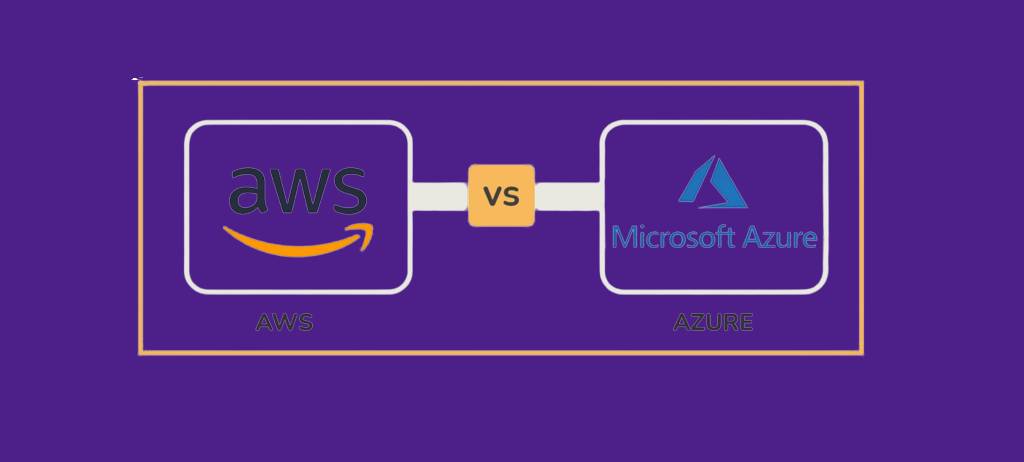As a result of its ability to help businesses of all sizes to quickly and affordably expand their operations and their infrastructure, cloud computing has emerged as a technology that is changing the game for businesses of all kinds. Two of the most well-known cloud platforms are (Amazon Web Services) AWS and Azure solutions, and between the two, they provide businesses a wide range of tools and services that can help them achieve their goals. However, picking between the two possibilities can be challenging. This article will contrast Microsoft Azure with Amazon Web Services (AWS) to help you decide which cloud computing platform is best for your business.
Azure:

Azure is used by many business organizations because of its seamless interaction with many Microsoft services and products inclusive of System Center, Windows Server and Active Directory. It makes it a lot easier for the enterprises to manage the IT environment by enabling them to easily link the IT infrastructure they already have in place with the infrastructure offered by Azure.
In order to ensure the privacy and security of user data, Azure also provides a wide range of security measures and compliance certifications, such as HIPAA, ISO 270001, and GDPR. In order to help users manage their cloud infrastructure, Azure also offers a variety of administration and monitoring tools, such as Azure Portal, Azure Monitor, and Azure Advisor. The Azure website provides access to these goods.
Due to Microsoft Azure Solutions‘ high degree of flexibility and scalability, users may easily adjust the number of computing resources they need to satisfy their company’s constantly changing needs. This is made possible by Azure’s pay-as-you-go pricing model, which enables users to pay only for the resources they use without having to make upfront payments or sign long-term contracts. Customers can also only pay for the resources they really use thanks to the pay-as-you-go pricing structure.
AWS:

AWS since its inception is providing a wide range of cloud computing services top allow enterprises and individuals to maintain and create an innovative IT infrastructure. AWS is based upon cloud computing.
AWS is said to be providing a big range of cloud-based computing services and tools to help enterprises and individuals to maintain and create innovative IT infrastructure.
A wide range of services are available from Amazon Web Services (AWS), all of which are designed to have high levels of scalability, flexibility, dependability, and security. If these services can be quickly and easily integrated with those of other tools and services, users will have an easier time building and managing complex information technology infrastructures.
One of the main benefits of using Amazon Web Service company is the ability to execute apps and store data across many locations due to the global network of data centers that AWS has.
Azure vs AWS

AWS and Azure are accepted by users worldwide and are opted by thousands of developers and enterprises. Here we will know about the key differences between Azure and AWS.
Read Also: Cloud Application Development For Enterprises: Complete Guide for 2023
The main differences between Azure and AWS are listed below:
AWS vs Azure: Safety and Adherence to Regulations
Security and compliance are two of the most crucial considerations to take into account when choosing a cloud platform. Both Microsoft Azure and Amazon Web Services (AWS) offer thorough security safeguards and uphold the industry standard for security and compliance certifications.
Amazon Web Service company, on the other hand, has been in existence for a longer time and has a more solid reputation for compliance and safety. Companies in the banking and healthcare sectors, for example, that must follow strict regulatory norms, favor AWS in particular.
On the other hand, Azure offers enhanced integration with Microsoft’s services and tools, which may be useful for businesses who currently utilize Microsoft’s products.

AWS vs Azure: User friendly
The user friendliness is an important factor to consider when choosing between AWS and Azure. Although both platforms have a learning curve, AWS is frequently thought of as being more difficult than Azure. AWS takes more technical knowledge to utilize than Azure due to AWS’s less user-friendly interface and less intuitive features.
AWS does, however, offer additional flexibility, which may be advantageous for businesses with more complex requirements. Additionally, AWS offers more thorough documentation and community support, which may be helpful for businesses with a high level of technical expertise.
AWS vs Azure: Scalability and performance are equally crucial
When using AWS or Azure, scalability and general performance are not concerns. Amazon Web Services (AWS) is able to offer better performance in some regions since it has a more extensive global infrastructure. The performance of both platforms is comparable in most places, and Azure is gradually gaining ground.
Only two of the more complex scaling methods AWS offers are auto-scaling and elastic load balancing. For businesses already utilizing those technologies, Azure’s tighter integration with Microsoft products like Visual Studio and System Center can make scaling and maintenance more convenient. Additionally, Azure provides better support for cloud-based apps.
AWS vs Azure: Instruction and Support
Support and documentation should also be given careful consideration when choosing a Cloud Computing Services. Compared to its rivals, AWS offers superior community support and a larger collection of documentation. Additionally, businesses with more complex needs can leverage AWS’s professional support staff and more sophisticated support services.
Additionally, Azure offers helpful support and documentation; although, given the size and complexity of the platform, it could be more challenging to find the precise details you need.
AWS vs Azure: Internet of Things:
In case you are working upon IoT devices, you can make use of many IoT features offered by both Azure and AWS. AWS provides a number of Internet of Things (IoT) services, such as AWS IoT Core, AWS Greengrass, and AWS IoT Analytics. Cloud application development for the Internet of Things can be managed using the AWS IoT platform. Internet of Things (IoT) services are also deployed, offered by Azure, and they are referred to as Azure IoT Central, Azure IoT Edge, and Azure IoT Hub respectively.
AWS vs Azure: Community assistance:
Both Microsoft Azure and AWS have many active communities that provide the participants with guidance, assistance and counsel. Due to its longer existence, Amazon Web Services (AWS) has a much larger user base as well as more third-party tools and services available. The community and ecosystem of partners and developers for Azure Application Development Services, are rapidly growing and are gaining traction.
AWS vs Azure: Artificial Intelligence and Machine Learning
Both the Microsoft Azure and Amazon Web Services (AWS) cloud platforms provide a wide range of developer tools and services; nevertheless, the AWS offering is superior in this regard. Software development, testing, and deployment are made easier for clients of AWS thanks to a variety of developer tools like AWS CodeStar, AWS CodePipeline, and AWS CodeDeploy. A higher level of technical proficiency might be required to fully utilize Azure Web App Development, such as Visual Studio and Azure DevOps.
AWS vs Azure: Disaster Recovery:
Both AWS and Azure provide reliable disaster recovery solutions, but AWS has an edge over Azure in terms of the range and depth of customization options it offers. The process of creating and administering disaster recovery plans is made easier by a number of AWS services, such as AWS Backup, AWS CloudEndure, and AWS Site Recovery. Azure also offers disaster recovery tools, such as Azure Site Recovery, but the options can be more limited.
AWS vs Azure: Geographical Coverage
With 77 availability zones dispersed across 24 countries, Amazon Web Services (AWS) offers a wider global network of data centers than Microsoft Azure does, which only has 61 regions globally. One platform might have a better geographic reach than the other, but it will depend on where you are and what your company needs.
AWS vs Azure: Support for Platforms
While Microsoft Azure places more of an emphasis on Windows-based operating systems, Amazon Web Services offers support for a wide range of platforms, including Windows, MacOS, Linux, and mobile devices. Amazon Web Services (AWS) may be a better choice if your organization runs predominantly on Linux or other operating systems in addition to Windows. AWS can help in Cloud Application Development for Enterprises and allow them to execute their actions in a better and easier way.
AWS vs Azure: Compliance and Security
HIPAA, PCI Data Security Standard, and ISO 27001 are just a few of the compliance and security certifications that both Amazon Web Services (AWS) and Microsoft Azure have earned. However, depending on the industry you work in and the location of your organization, the precise certifications and compliance requirements could differ. To ascertain whether or not the compliance and security options provided by competing platforms fulfill the needs of your business, it is crucial to thoroughly examine their offerings.
AWS vs Azure: Customer Support
Both Microsoft Azure and Amazon Web Services (AWS) offer customer support, although the quantity of assistance offered by each choice can vary depending on the subscription tier and the type of support needed. AWS offers a wide range of support choices with varied degrees of access to technical support, whereas Azure offers support through a number of channels, including chat, phone, and email. It’s crucial to consider the amount of customer service you require when choosing between Amazon Web Services (AWS) and Microsoft Azure, and to confirm that the platform you select gives the level of support you require.
AWS vs Azure: Big Data and Analytics
If the processing of big data and analytics is a major part of your business, you can choose from a wide range of options both AWS and Azure offer. Amazon Web Services (AWS) offers numerous services, including Amazon EMR (Elastic MapReduce), Amazon Redshift, and Amazon Athena. Azure HDInsight, Data Lake Analytics, and Databricks are just a few of Azure’s services. Choose the platform that best satisfies your big data needs by comparing each offer’s different products and services.
A platform for the Internet of Things (IoT): Microsoft Azure and Amazon Web Services (AWS) offer strong IoT platforms if your business specializes in IoT solutions. The two most crucial services, AWS IoT Core and Azure IoT Hub enable device connection, management, and data processing. Consider the specific Internet of Things requirements your business has, and compare the features and degree of user-friendliness each platform offers for Internet of Things deployments.
AWS vs Azure: Hybrid cloud capabilities
Hybrid cloud deployments are rising in which businesses combine on-premises infrastructure with public cloud services. Hybrid cloud installations include hybrid cloud capabilities. Microsoft Azure and Amazon Web Services both provide hybrid cloud computing services. While Amazon Web Services (AWS) offers services like AWS Outposts and AWS Storage Gateway, Azure offers services like Azure Stack and Azure Arc. When implementing a hybrid cloud strategy, you should assess each platform’s integration and compatibility options.
AWS vs Azure: Machine Learning and Artificial Intelligence
Many industries are transformed by artificial intelligence and machine learning. Amazon Web offerings and Microsoft Azure provide broad AI and ML offerings. Amazon Web Services (AWS) provides Amazon Comprehend, Amazon Rekognition, and Amazon SageMaker in addition to its other services. Azure Cognitive Services, Azure Machine Learning, and Azure Bot Service are just a few of Microsoft Azure’s services. Research your business’s specific AI and ML requirements and the platform’s offerings’ functionality and ease of use.
Success stories and case studies Investigate case studies and success tales from businesses similar to your own that have employed AWS or Azure. Look at the strategies these firms have used to achieve their goals and solve the specific difficulties on the platforms. This information may offer thought-provoking takeaways and help you make an informed decision based on real-world examples.
AWS vs Azure: Integration
Both AWS and Azure have a large range of cloud integration options, but they differ from one another in terms of the services they may be integrated with. While Amazon Web Services (AWS) offers a wider range of services and connectors, Azure is focused on integrating with Microsoft products and services. Azure might be the better choice for you if your business already employs Microsoft products; but, if you use a variety of services and platforms, AWS might be the better choice.
Compared to Azure, AWS has a larger and more vibrant development and user community. AWS also provides a wider range of resources, including blogs, online forums, and tutorials. Resources The development and user communities for Amazon Web Services (AWS) are larger and more vibrant than those for Microsoft Azure. Azure offers a huge community and a ton of resources available to you, although these might not be quite as complete as those provided by AWS. The accessibility of resources and community assistance should be taken into account while choosing between AWS &Azure. This is crucial if you need aid or guidance navigating the cloud platform.
Both Microsoft Azure and Amazon Web Services (AWS) are consistently adding new features and building out new services.
Making the Decision
Prior to making a decision, it is crucial to carefully analyze your company’s needs, your level of technical expertise, and your budgetary restrictions. By conducting the appropriate research and planning, you can select the cloud platform that is right for your business and take advantage of the many benefits that come with using cloud computing services.
Do know that new services and features are added to both Azure and AWS and both of them keep on changing with time. Always ensure that your cloud integration should be effective and efficient to handle that platform evolution and transition. It is also quite important that you stay up to date on the most recent advances and breakthroughs in both platforms.
To Conclude
Azure and AWS offer unique advantages to their clients and they can be differentiated from each other as per their offering for a big range of clients. Azure can be seen focusing on business customers and also offers many affordable ways to scale down and up test environments. On the other hand, AWS is seen to offer a great variety of resources and services to their clients. Consequently, the chances are quite high that both of these platforms will continue to coexist and work well for cloud platforms and be the top of users’ minds depending on their preference of features, security, scalability, compliance, and cost as per their business cases.



